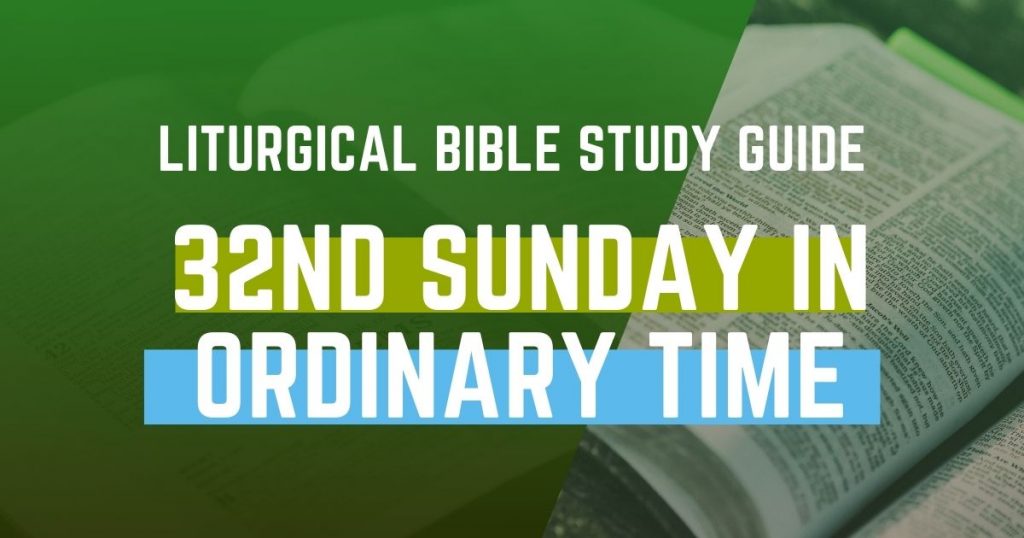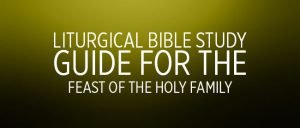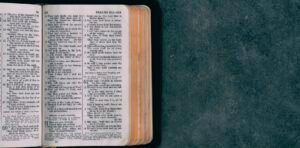Gospel
Last week’s reading, as you will recall, took place in Jerusalem after Jesus’ triumphal entry and before the beginning of His passion. At that time He told them when asked what was the greatest of the commandments “The first is, ‘Hear O Israel: The Lord our God, the Lord is one; and you shall love the Lord your God with all your heart, and with all your soul, and with all your mind, and with all your strength.’”
These are the opening words of the Shema, which the devout Jew recited (and still today prays) every day. Jesus then volunteered the second in importance: “You shall love your neighbor as yourself.” Jesus’ response surprised His listeners because the Pharisees had counted God’s commandments and these two were not among the 613.
As a way of introduction to today’s reading we will do a quick study of the three verses which join last week’s reading to this one:
As Jesus was teaching in the temple area he said, “How do the scribes claim that the Messiah is the son of David?
God’s Messiah was commonly identified with a descendent of David and therefore a legitimate pretender to the throne of Israel (see 2 Samuel 7:11b-16). Jesus appears to challenge this view in the next two verses.
David himself, inspired by the holy Spirit, said: ‘The Lord said to my lord, “Sit at my right hand until I place your enemies under your feet.’”
Jesus quotes Psalm 110:1, a psalm quoted often in the New Testament by the evangelists to show Jesus’ prefigurement in the Old Testament. By ascribing the psalm to David, Jesus supports the traditionally accepted view that David was the author of the Psalms. Jesus further states that David wrote under the inspiration of the Holy Spirit.
David himself calls him ‘lord’; so how is he his son?” (The) great crowd heard this with delight.
Assuming that David is the speaker in Psalm 110, he must be talking about someone other than himself. The first “Lord” is God, the second “my lord” must be someone different from and superior to David (the Messiah). Therefore, the Messiah is not adequately and fully described simply as “the Son of David.”
First Reading
What we now know as 1 and 2 Kings is designated in older Catholic Bibles as 3 and 4 Kings. Likewise, what we know as 1 and 2 Samuel is called 1 and 2 Kings in the older Catholic Bibles. This is because in the Hebrew Bible a division was made between the books of Samuel and Kings while the Septuagint (Greek translation) had only one division called the “books of kingdoms”. Protestant Bibles, because the followed the Hebrew canon have always had 1 and 2 Samuel followed by 1 and 2 Kings; just as they have always been missing the seven Old Testament books unique to the Septuagint (and Catholic Bible).
The books of 1 and 2 Kings in all modern Bibles are a compilation from various sources which record:
1) The last days of king David and the enthronement of Solomon (1 Kings 1 and 2).
2) The reign of king Solomon; his wisdom, the building of the temple, and the visit of the Queen of Sheba (1 Kings 10:1-13).
3) Solomon’s fall and death (1 Kings 11).
4) The division of the kingdom under Solomon’s son Rheoboam, and the history of the 2 kingdoms of Israel and Judah until the fall of Samaria and the extinction of the kingdom of Israel (1 Kings 12 through 2 Kings 17).
5) The history of the kingdom of Judah until the Babylonian captivity in 586 B.C. (2 Kings 18-25).
1st and 2nd Kings actually form one continuous book. Hebrew tradition holds that this compilation was done by the Prophet Jeremiah (562-539 B.C.) during the Babylonian captivity. It was written for the Jews who had witnessed the catastrophe of 586 and for their children whose faith was wavering. It was intended to instruct and encourage them, to elicit from them acts of repentance for their past sins, and to renew their hopes for the future. It instructs the exiles by demonstrating that Israel, through her kings, has been unfaithful to the covenant, and that God, far from being unfaithful to his part of the covenant, has remained faithful and patient with erring Israel long after Israel’s infidelity. God’s covenant is a holy family bond which cannot be annulled or retracted. The author returns repeatedly to the promise of perpetuity made to the Davidic dynasty, the Temple, and Jerusalem. It is upon the fulfillment of these promises that Israel must place her hopes for the future.
Today’s reading comes from the account of Elijah, Ahab, and the three year drought and is a prediction-fulfillment story.
Second Reading
Last week we looked at Chapter 7 as background for the reading. This week we must race through chapters 8 and 9 to gain the background: 8:1 The main point of what has been said is this: we have such a high priest, who has taken his seat at the right hand of the throne of the Majesty in heaven, 2 a minister of the sanctuary and of the true tabernacle that the Lord, not man, set up [we have a priest and a king, we have a priest-king]. 3 Now every high priest is appointed to offer gifts and sacrifices; thus the necessity for this one also to have something to offer [Jesus offers His glorified body on the ark of the covenant in heaven (Revelation 5:6)]. 4 If then he were on earth, he would not be a priest, since there are those who offer gifts according to the law [the Levites]. 5 They worship in a copy and shadow of the heavenly sanctuary, as Moses was warned when he was about to erect the tabernacle. For he says, “See that you make everything according to the pattern shown you on the mountain [see Ezekiel 36:26].” 6 Now he has obtained so much more excellent a ministry as he is mediator of a better covenant, enacted on better promises. 7 For if that first covenant had been faultless, no place would have been sought for a second one. 8 But he finds fault with them and says: [what follows is quoted from Jeremiah 32:31-34 (Hebrews 8:8-12); the longest Old Testament quotation in the New Testament. It is also the only Old Testament text where the new covenant is specifically mentioned] “Behold, the days are coming, says the Lord, when I will conclude a new covenant with the house of Israel and the house of Judah. 9 It will not be like the covenant I made with their fathers the day I took them by the hand to lead them forth from the land of Egypt; for they did not stand by my covenant and I ignored them, says the Lord [this is quoted from the Greek (Septuagint). The Hebrew says “I became their master”. Recall that after the golden calf, man no longer had a father-son relationship with God but rather a master-slave relationship]. 10 But this is the covenant I will establish with the house of Israel after those days, says the Lord: I will put my laws in their minds and I will write them upon their hearts [see Ezekiel 36:26 where stony heart refers to the 10 commandments written on stone and heart of flesh is the new covenant laws of love which are written on the heart]. I will be their God [their Father], and they shall be my people [my family]. 11 And they shall not teach, each one his fellow citizen and kinsman, saying, ‘Know the Lord,’ for all shall know me, from least to greatest. 12 For I will forgive their evildoing and remember their sins no more.” 13 When he speaks of a “new” covenant, he declares the first one obsolete. And what has become obsolete and has grown old is close to disappearing. 9:1 Now (even) the first covenant had regulations for worship and an earthly sanctuary. 2 For a tabernacle was constructed, the outer one, in which were the lampstand, the table, and the bread of offering; this is called the Holy Place. 3 Behind the second veil was the tabernacle called the Holy of Holies, 4 in which were the gold [Gold signifies royalty. The gold described here is in the Holy of Holies, the divine place] altar of incense and the ark of the covenant entirely covered with gold. In it were the gold jar containing the manna, the staff of Aaron that had sprouted, and the tablets of the covenant. 5 Above it were the cherubim of glory overshadowing the place of expiation. Now is not the time to speak of these in detail. 6 With these arrangements for worship, the priests, in performing their service, go into the outer tabernacle repeatedly, 7 but the high priest alone goes into the inner one once a year, not without blood that he offers for himself and for the sins of the people. 8 In this way the holy Spirit shows that the way into the sanctuary had not yet been revealed while the outer tabernacle still had its place [the old covenant. It is human, natural, physical, external, bodily. Internal transformation is needed to make it golden] (which is symbolic for the present age) [A time of transition between the old and new covenants. 40 years (A.D. 30 Christ is crucified, A.D.70 the temple {old covenant} is destroyed)]. 9 This is a symbol of the present time, in which gifts and sacrifices are offered that cannot perfect the worshiper in conscience [the old covenant is not effective – this implies that the new covenant is] 10 but only in matters of food and drink and various ritual washings: regulations concerning the flesh, imposed until the time of the new order [external regulations which perfect the body but not the soul]. 11 But when Christ came as high priest of the good things that have come to be, passing through the greater and more perfect tabernacle not made by hands, that is, not belonging to this creation, 12 he entered once for all into the sanctuary, not with the blood of goats and calves [the requirement for Aaron and his sons when first ordained as high priest (Leviticus 8)] but with his own blood, thus obtaining eternal redemption [the old covenant gave earthly redemption]. 13 For if the blood of goats and bulls and the sprinkling of a heifer’s ashes can sanctify those who are defiled so that their flesh is cleansed, 14 how much more will the blood of Christ, who through the eternal spirit [the Holy Spirit] offered himself unblemished to God, cleanse our consciences from dead works to worship the living God [the old covenant purified persons by sprinkling – the new covenant purifies through drinking (the Eucharist)]. 15 For this reason he is mediator of a new covenant: since a death has taken place for deliverance from transgressions under the first covenant, those who are called may receive the promised eternal inheritance. 16 Now where there is a will, the death of the testator must be established. 17 For a will takes effect only at death; it has no force while the testator is alive [the Greek word for “will”, “testament”, and “covenant” is the same. A more proper translation is “covenant” in all cases. {Rereading using “covenant:” 15 “For this reason he is mediator of a new covenant: since a death has taken place for deliverance from transgressions under the first covenant, those who are called may receive the promised eternal inheritance. 16 Now where there is a covenant, the death of the testator must be established. 17 For a covenant takes effect only at death; it has no force while the testator is alive”}]. 18 Thus not even the first covenant was inaugurated without blood. 19 When every commandment had been proclaimed by Moses to all the people according to the law, he took the blood of calves (and goats), together with water and crimson wool and hyssop, and sprinkled both the book itself and all the people, 20 saying, “This is ‘the blood of the covenant which God has enjoined upon you.’” 21 In the same way, he sprinkled also the tabernacle and all the vessels of worship with blood. 22 According to the law almost everything is purified by blood, and without the shedding of blood there is no forgiveness. 23 Therefore, it was necessary for the copies of the heavenly things to be purified by these rites, but the heavenly things themselves by better sacrifices than these.





